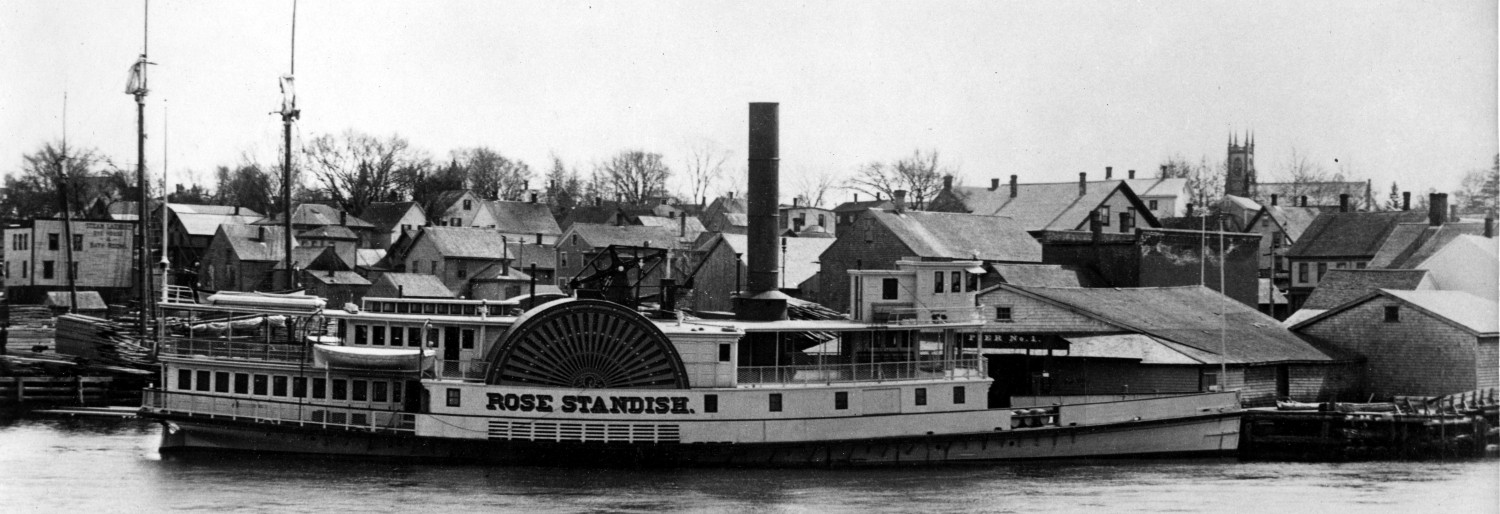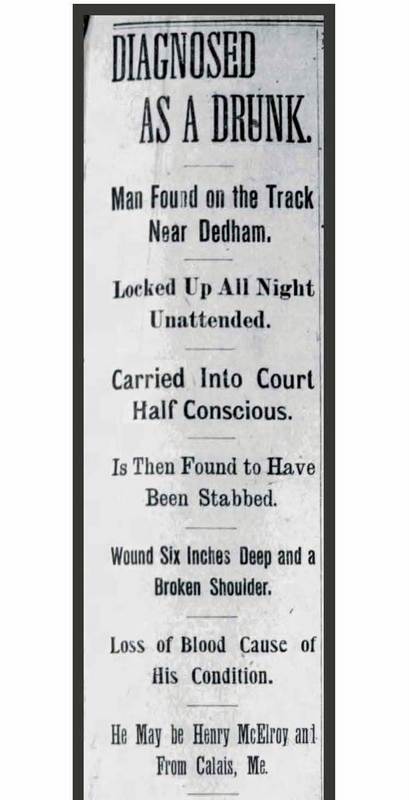
When the bleeding, battered, bruised, badly perforated and barely alive body of Henry McElroy was found by the railroad tracks in Dedham Massachusetts in March 1903, it caused quite a stir in the Boston area.
The Boston papers found it a most mysterious affair and folks from Dedham were sufficiently embarrassed to claim that whatever had happened to the fellow had most likely occurred in Boston, probably perpetrated by the Italian gangs of Boston’s ‘Little Italy” in the city’s North End. Dedham locals claimed the culprits, believing McElroy to be dead, had transported the body by train to Dedham to confuse the authorities which, as time would show, was not a very difficult task where the Dedham authorities were concerned.
Henry McElroy was initially thought to be from Calais, a reasonable supposition given the train ticket found in his pocket but, in fact, he was from a small community outside of St. Stephen called Meredith Settlement. The Boston Globe of March 19, 1903 described Henry’s injuries and his deplorable treatment at the hands of the authorities in Dedham.
An unknown man, whose name may possibly be Henry McElroy was found unconscious on the railroad track near Green Lodge yesterday noon. The case was diagnosed as one of alcoholism by Dr. John W. Pratt, but this afternoon it was discovered at the county jail that the man had a wound six inches deep in his back, a broken shoulder blade, two bad cuts on the right arm and a bruised hand, and that he was unconscious from loss of blood. Among the effects in his pockets were a sleeping car ticket from Calais, Me, to Boston; a Boston stamp; Maine baggage check and $1.10 in change. He seems to be about 50 years old, 5 feet 8 inches tall and weighs about 160 pounds. His hair is black and streaked with gray, and he has a dark mustache. He was neatly dressed in a ready-made suit of black, interwoven with brown; a white and blue striped shirt and home-knit stockings. On his narrow-toed shoes was the name H. T. Humphrey.
It is believed that the man has relatives in Boston, for although he could not talk very coherently tonight, he kept repeating that he wished to see his brother-in-law, Henry Meredith. If the man survives, it will probably be a day or two before he will be able to tell how he received his injuries. Nothing is known except that yesterday about noon word was sent to the Westwood police that a man had been found near the railway tracks at Green Lodge. Constable Fred Fisher drove to place and brought the man in his carriage to the Dedham lockup, a distance of three miles.
The constable supposed the man was merely drunk but after getting him to the jail he called Dr. Pratt, who said the unknown was probably suffering from alcoholism, as he appeared dazed. The man was accordingly left alone in his cell, without medical attention, the rest of the afternoon and all night, until today, when he was carried, half unconscious to the district court and arraigned as a vagrant before Judge Grover.
He was unable to answer the questions put to him, and he could not even plead guilty or not guilty. The Judge then ordered a plea of not guilty entered for him, and on the recommendation of probation officer Shultz continued the case till Monday, placing the man under bonds of $200.
Then the man, still unconscious, was carried back to the lockup, and there his real condition was discovered when the officials stripped him preparatory to giving him a bath. His undershirt was saturated with blood.
Dr. Francis Babcock physician for the county jail was summoned, and he determined the extent of the man’s injuries. The wound in the back seems to have been made with a stiletto rather than with a knife, for it is quite round. Dr. Babcock probed it six inches without reaching its full depth. The physician was of the opinion that the victim had also been drugged.
Repeated attempts to elicit definite information from him failed. He could only mumble incoherent words, although the officials are tolerably certain that he spoke of Henry Meredith as his brother-in-law. And he also said or seemed to say his name was Henry McElroy.
The police think it is evident that either he was stabbed and dropped off a train, or else that he was carried to the place where he was found. The immediate locality is sparsely settled. Efforts will be made tomorrow to find out.
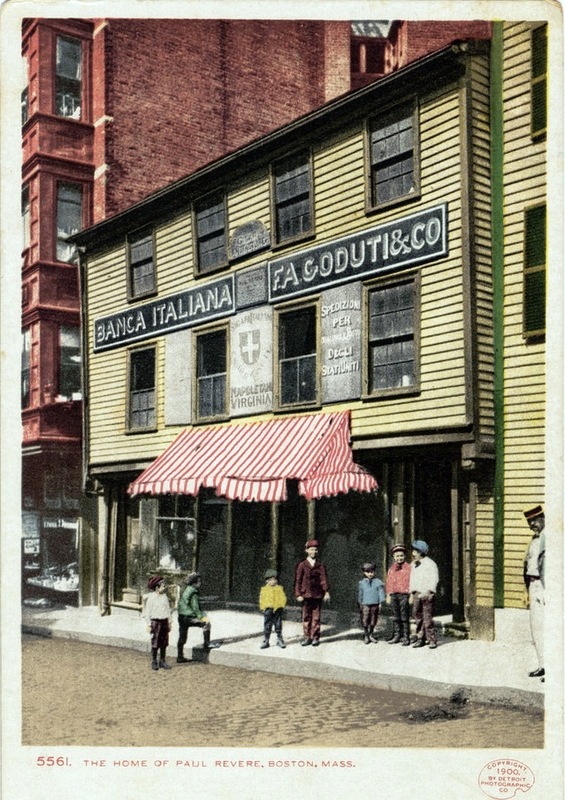
Boston’s other paper, the Herald, had much the same information about the case, but dug a good deal deeper into the mystery. Further, the Herald disputed other local reports, probably from Dedham, that the victim had fallen prey to the Boston’s North End Italian gangs whose signature weapon was the stiletto.
Boston Herald March 19, 1903:
DRUGGED, STABBED, LAID BY THE TRACK
When Constable Fred Fisher obeyed a summons Tuesday to go to Greenlodge, Westwood to take charge of a man who had been picked up by the side of the tracks of the New Haven road and carried into the station, he little thought he was starting on the trail of a case which might take the detective ability of a Sherlock Holmes. Such, however, seems to be the outcome.
Fisher went to the little station. Here he found a man weak, dazed, unable to care for himself or able to explain anything concerning himself that seemed reasonable. His speech was broken’ incoherent, hard to understand. Fisher thought the man ill and sent to Dedham for a physician who pronounced the man as apparently suffering from the effects of too much drink. Fisher took the man in custody and lodged him in the lockup. Yesterday morning he brought him before the District Court in Dedham on a charge of being a vagrant.
The name under which he was arraigned was Henry McElroy, which may or may not be the man’s real title.
From the first it was plain to see the man could not comprehend what was going on about him. He sat in the chair and gazed with fixed eyes at whatever object was in his line of vision. By direction of the Court a plea of not guilty was entered in his case.
Constable Fisher told all he had been able to discover, which was little, owing to his inability to make McElroy understand, or in understanding, because of an inability to tell what he apparently at times tried to.
Judge Grover thought the case most peculiar and one that should be thoroughly investigated. To give Probation Officer Shultz, Constable Fisher and others a chance to probe the mysteries of McElroy’s case he continued the case until next Monday. He also directed that the man be given medical treatment.
All the time McElroy was in Court he showed that he was suffering and to the observer from the effects of knockout drugs or some other stupefying drug. He was taken to the County jail on Village Avenue in a carriage. Here a startling discovery was made by the official of that institution. His clothing was searched. A Pullman car check from Calais Maine to Boston, a check for baggage in Boston, a dime and a silk handkerchief were found. But no clew to his name.
He was then taken to the bathroom. Then it was found the man had been the victim of foul play, a murderous attack. The clothing was neat, evidently recently purchased, the underclothing of good material. His stockings were woolen, and his shoes were marked “H. T. Humphrey”. His shirt, vest and coat were blood soaked. Two deep wounds were disclosed, one under his right shoulder blade and the other on his right forearm. There was also a cut or bruise on one of his hands.
The wounded man was cared for and then put to bed. He immediately dropped into a deep slumber, which lasted until 4 O’clock yesterday afternoon. At this hour Dr. Francis Babcock, the jail physician, aroused him for an examination of his injuries. Babcock found McElroy’s right shoulder blade broken, the result of either a fall or a blow. The wound at the back was probed to a depth of six inches. A second cut was also found on the arm. The physician expressed the opinion the wound to the back was made by a stiletto.
While the doctor was working over him McElroy kept asking for a brother-in-law whom he called “Henry Meredith”.
McElroy is a man about 50 years of age and weighs fully 150 pounds. His face is smooth shaven. His hair and eyes are dark.
It is thought McElroy traveled from Calais, Me to Boston; that he had a good supply of money with him; that he fell somewhere into bad company- the stiletto wound would seemingly indicate the North End- and was robbed and assaulted; that his assailants, fearing serious results from their acts took him by train or team to Greenlodge and left him at or on the railroad tracks in hopes he would be crushed by the next train. It is also believed that before he was taken to Greenlodge he was dosed with some poison that robbed him of his senses and which ties his tongue so that he cannot tell a connected story.
No One was found last night who had received any request for assistance from the Dedham police, or any information regarding the crime. The disregard for the theory that McElroy was the victim of foul play in this city before being placed on the railroad tracks at Westwood is based on a reasonable theory. It is not denied such a thing was and is possible. It is not so many years ago that a man from Maine who had been drugged and robbed in this city was put aboard a train for home by his robbers who considerately bought him a ticket and shipped him East before he recovered from the effects of the drug administered. But that men would, in addition to drugging, robbing, and stabbing a man go the trouble of taking him miles into the country to dispose of him is regarded as improbable. Murderers at the North End usually do their work in a more business-like manner. There are plenty of places in Boston, as in any great city, where a man can be handily drugged and robbed and more of it is done right here than the public has a notion of. But when stilettos are resorted to in addition there is a river and a harbor close at hand, to say nothing of other places for the concealment of a man who is thought to be dead.
That McElroy was thought to be dead when placed by his assailants where he was found is more than probable. Unconscious from the effects of the drug from which he is still suffering and with a wound in his back which was found after he had been in the hands of the authorities for more than a day, he might reasonably be expected to be beyond help and, if cut to pieces by a train, would have died without ever a trace of the true secret of his killing. That he revived sufficiently to drag himself from the track to the point alongside the rails where he was found is also reasonable, still assuming he was placed directly on the tracks by those who are supposed to have taken him to Westwood.
But that any North End assassin or assassins would go to the trouble of taking a supposed dead man so far from the spot where the crime was theoretically committed is not a theory that is received with favor by the Boston Police. It may have happened, but it is more likely the assault was committed nearer where the man was found. This may be settled if prompt and intelligent investigation is made, but more than a day of valuable time has been lost. Determining the identity of McElroy may afford a clue that will be of value and this, it seems, may be furthered by the examination of his baggage, supposed to be at North Station. The mystery is a deep one and unless its chief figure is able to give very definite information if he recovers.
Very naturally the Boston Police are inclined to discredit the Dedham theory that the victim of the strange assault which is now puzzling officers of that town came to his undoing in this city. Naturally also and not without foundation in fact they are outspoken in their estimation of the management of a police department which permits such an occurrence as that of yesterday in Dedham. As one officer said last night: “If such a thing happened in one of our stations, I guess some one’s bones would rattle.” That a man suffering from the injuries that were found on McElroy should be allowed to lie in captivity and suffer until so tardy an examination of him was made seems incredible. It would seems as though a proper search of his clothing at the time of his arrest would have revealed its blood-soaked condition and that he should be put into Court so plainly suffering from drugging without more than a superficial medical examination which consigned him to a cell when he should have been in a hospital Tuesday was a source of wonderment last night to all the officers a Herald man talked with in the beginning of an attempt to shed light on what now promises to be a celebrated case.
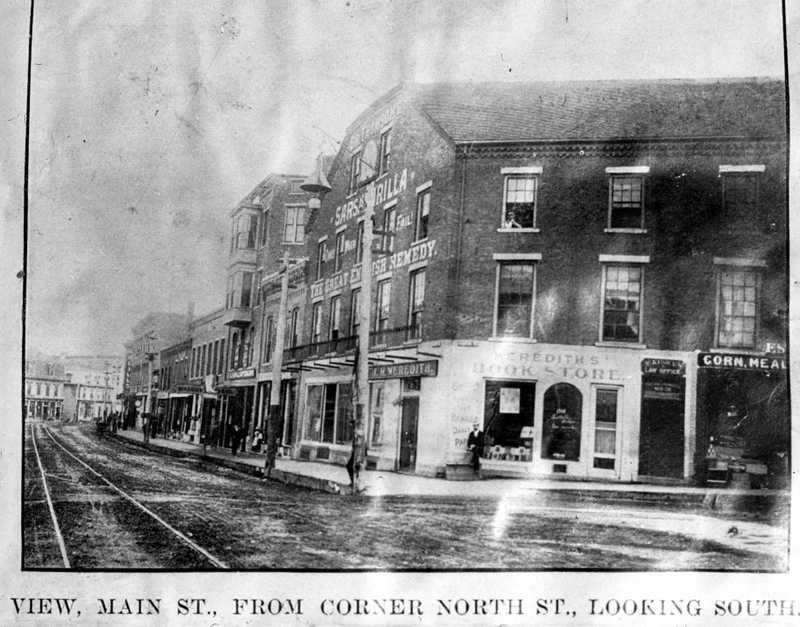
The reporter for the Herald also showed some initiative in following up the one clue, other than his name, that Henry McElroy had provided the police- his repeated statement and only coherent one that his brother-in-law was Henry Meredith. The Herald, believing the victim was from Calais, managed to find Henry Meredith in Calais. Meredith was the owner of Meredith’s Bookstore at the corner of Main and North streets in what we know locally as the “Sarsaparilla Building”. Meredith didn’t know Henry but did manage to connect the McElroy name to the Meredith Settlement outside of St. Stephen.
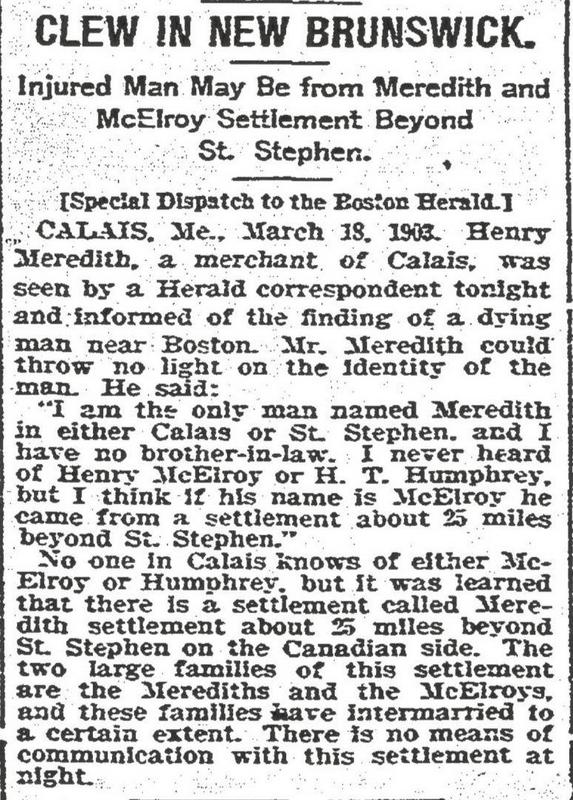
The next day the Herald reported new developments in the case:
March 20 1903 Boston Herald:
Henry McElroy or as he should be known be known, Joseph Henry McElroy, for that is his full name, spent a very comfortable day at the Dedham jail yesterday and, for the first time since he was picked up by the railroad tracks near Greenlodge Station, Westwood, took some nourishment- a little beef tea.
Owing to much loss of blood from his wounds and the effect of the knockout drops administered to him before or after he was assaulted by some person or persons as yet unknown, he spent most of his day and night in sleep. He has not yet told his story, and it is doubtful he ever will, as his memory seems a perfect blank.
Yesterday morning a sealed envelope with an address written on it- Mrs. H Ramsdell, Littleton Mass-was found in one of his pockets. There was nothing inside the envelope, but on communicating with authorities at Littleton it was learned a Mrs. Ramsdell lived there and proved to be the sister of McElroy. She first asked to have him taken to her home so that she might care for him. He will probably be in Dedham Court this morning and the complaint against him will probably be dismissed. Mrs. Ramsdell says he is a resident of Meredith Settlement, near St. Stephen New Brunswick. Probation Officer Shultz of the District Court of Northern Norfork talked with her over the telephone yesterday afternoon. The sister told Mr. Schultz that her brother left St. Stephen N.B. Friday March 13 to pay her a visit. She meant to meet him at Union Station last Saturday night but was unable to get there. She says her brother is in very comfortable circumstances, and that he is a lumber merchant, married, and has a family. As to his habits he has not drunk any intoxicating liquors for the last four months. She is to come to Dedham tomorrow morning to see her brother and if his physical condition allows, take him to her home in Littleton.
Another article in the Herald follows reporting friends from St Stephen confirm Henry left St Stephen March 13 “to obtain surgical treatment in Boston” not, as his sister claims, to pay her a visit.
Henry did not survive to be cared for by his sister in Littleton. He soon succumbed to his wounds, however inflicted, and perhaps more causally to the ineptitude and lack of medical care of the authorities in Dedham. The Boston Police had not been shy in pointing out failures of the Dedham Police which lost a day before even discovering a crime had been committed. During that time Henry McElroy was actually bleeding to death in his jail cell from stiletto wounds. Having botched the investigation completely, the only way to now solve the crime was apparently to find there was no crime. A quick autopsy was arranged.
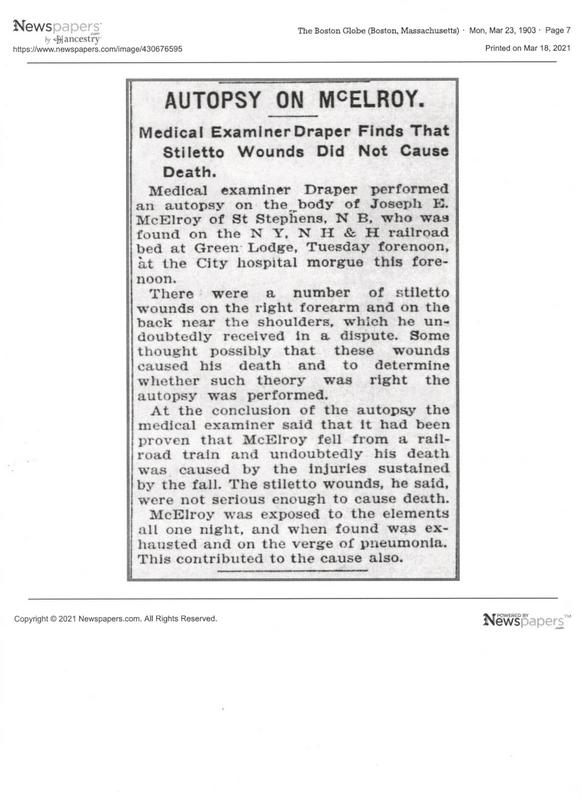
The following day the case was officially dropped after the medical examiner found no evidence of foul play even though the deceased had been stabbed with a stiletto several times, one wound having been found to have penetrated to a depth of at least 6 inches. Nonetheless there was “No Case For the Police”:
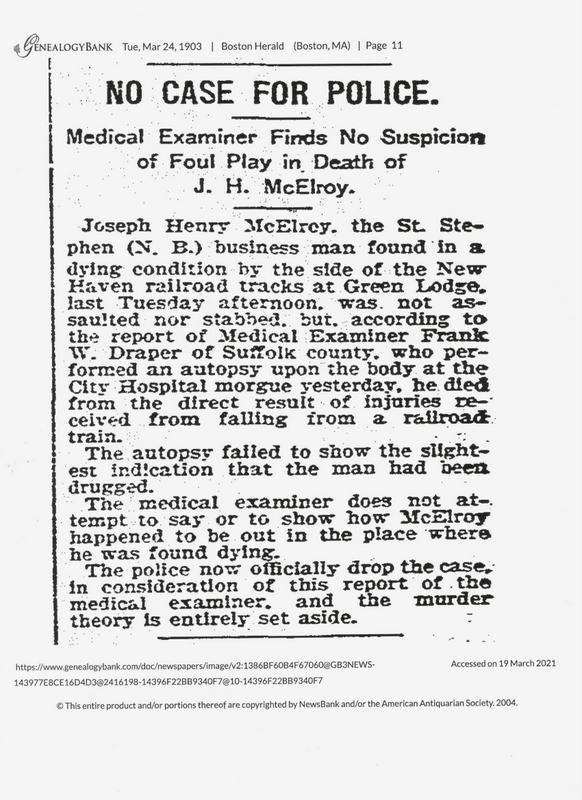
There do remain, however, a number of unanswered questions. Why was Henry McElroy in Boston? If to “obtain medical treatment” as claimed by his friends, why was he leaving Boston on the New Haven train that night and, if instead, he was going to visit his sister in Littleton why take the train south to New Haven Connecticut when Littleton is northwest of Boston?
Further, if he intended to leave Boston why didn’t he collect his luggage at the baggage claim at North Station in Boston? The newspapers report he had in his possession either $1.10 or a dime when he was found, an insufficient amount to finance any travel plans he may have had.
Indeed it is more likely that “foul play” caused the death of Henry McElroy and as easy as it may have been to blame the “Italians” of Boston’s North End, the Dedham authorities played a major role in Henry’s death. Likely they were well aware as we say today that “the optics were bad”, circled the wagons and found a compliant medical examiner to “put the case to bed” as quickly as possible. Still the more one looks at the facts, the “curiouser and curiouser” the case becomes.

